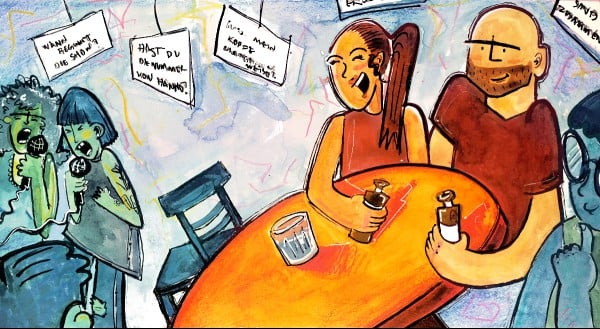4 Sci-Fi Universal Translators (And 1 Possibly Real One)
Photo: LucasFilm Science fiction is often applauded for its ability to predict future technologies. These tools might be for the better (the smart wat

The German language doesn’t always make things easy. The Case of the Possessive Genitive S is as complicated as, well, the German concept of case. For example, what if you’re standing in front of your favorite restaurant and suddenly you start to wonder: Is the apostrophe in “Mario’s Pizzeria” supposed to be there? Couldn’t it have just as easily been called “Marios Pizzeria”? Well, what about if the restaurant is owned by an Andreas? One errant “s” could ruin his sign: Andreass Grillbar doesn’t look so great. Not to mention, poor Andreas is also one misplaced apostrophe away from the restaurant belonging to his sister, Andrea’s Grillbar.
So we can see here that the little apostrophe is actually a pretty big deal, and where you place it makes an equally big difference. Use it wrong, and a masculine name turns into a feminine before our very eyes. And we don’t want that…or maybe we do? So what is the deal with the genitive apostrophe in German?
Let’s start with the easy part. When you’d basically like to say that something belongs to someone, then you do this with the genitive case (the “second case” in German) and an s, but without the apostrophe. So we say:
So far, so good. But you know what’s coming next. It wouldn’t be German if the genitive s were really that simple. So let’s get on with it.
It gets a little more complicated if the person to whom something belongs is called Max, Marius or, yes, Andreas. With these proper names we can’t just put an s on the end, because that will sound or look strange. That’s why when names end in an “s” sound, you use a genitive apostrophe. But not just anywhere — that apostrophe goes at the end! Andreas, then, should call his establishment “Andreas’ Grillbar.” Makes sense, right? So in these cases (cases, get it?) the apostrophe replaces the genitive s.
This rule is valid for all proper names whose basic form ends in s, ss, ß, tz, z, x or ce. Common examples of this include:
Have we solved the case? No.
Alas, the German language won’t leave us in peace, because there’s yet another condition for this grammatical case. You only use the apostrophe if no article (or similar) comes before the noun. If your eyebrows are shooting up right now, don’t worry. Your confusion is more than understandable. Let’s work through an example together.
Hans Sachs’ Gedichte (Hans Sachs’ poetry) needs its apostrophe because Sachs ends with an s and no article (“the,” “a,” etc.) comes before the proper name “Hans Sachs.” However, it looks quite different when you say “the poetry of Hans Sachs”: Die Gedichte des Hans Sachs. The proper name still ends with an s, but now there’s an article (“the”) in front of it. So, the genitive apostrophe disappears.
The same goes for Max’ Schule (“Max’s school”). Here you have to use an apostrophe because both conditions are met: The proper name ends with x and there’s no article (or similar) before it. But if you turn the example around, once again it looks quite different, because then it goes die Schule unseres kleinen Max, or “the school of our little Max.”
Got it? Great, now we’ll confuse you just a little bit more.
The good news is that Mario doesn’t need to repaint his sign or get his menus reprinted. Because in this case, it’s correct.
Wait, but how? Mario doesn’t end with s and therefore, according to Rule 1, should use the genitive s without the apostrophe. Well, that’s also true! Indeed, here the Duden makes another exception. If you’d like to emphasize the basic form of a person’s name, for example in business names, the apostrophe is allowed.
Thus “Mario’s Pizza” can justify its existence, even if some Germans claim to be bothered by what they colloquially call the Deppenapostroph, or “the dimwit’s apostrophe.” This expression, incidentally, refers to all apostrophes, which theoretically do not have to be used in the German language.
But we can leave that be — for as long as we follow the Duden’s rules, we’ve got nothing to worry about…right?
This article originally appeared on the German edition of Babbel Magazine.

Photo: LucasFilm Science fiction is often applauded for its ability to predict future technologies. These tools might be for the better (the smart wat

The English language is a patchwork. Despite being a Germanic language, its linguistic influences come from all over. Words we use every day might hav

Illustration: Daniel Marin MedinaWhen looking for the perfect tandem partner, it’s easy to feel like Goldilocks. When I moved to Berlin seven years ag

The first decade of the 21st century ended not that long ago, and it’s really only now that we as a society can begin to make sense of it. Yet the 200

You can choose fighting words or loving words — language is vast enough to encompass it all. Yet while it can be a lot of fun how to insult someone, d

Watching movies is undeniably one of the best ways to learn a new language because they help you understand the quirks and intricacies of the language

Linguistic diversity is absolutely fascinating. With its unique grammar, vocabulary, history and literature, every language is, by nature, a world to

Rio de Janeiro is a city rich in culture, food, music and more. From Carnaval to Christ the Redeemer to any number of other beautiful sights and celeb
We are a comprehensive and trusted information platform dedicated to delivering high-quality content across a wide range of topics, including society, technology, business, health, culture, and entertainment.
From breaking news to in-depth reports, we adhere to the principles of accuracy and diverse perspectives, helping readers find clarity and reliability in today’s fast-paced information landscape.
Our goal is to be a dependable source of knowledge for every reader—making information not only accessible but truly trustworthy. Looking ahead, we will continue to enhance our content and services, connecting the world and delivering value.